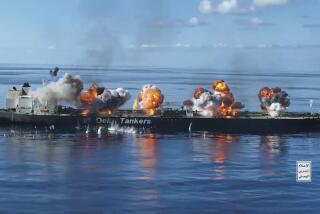Fire Burns Off Most of Oil on Grounded Ship
- Share via
COOS BAY, Ore. — A grounded cargo ship that had been set ablaze to prevent a disastrous oil spill broke apart, but the strategy appeared to be working Friday, with most of the fuel being consumed before it could reach the shoreline.
“We did the right thing,” said Coast Guard Chief Petty Officer Gene Maestas. “By burning the oil, we prevented it from spilling into the ocean.”
Coast Guard Capt. Mike Hall added: “Every gallon that is burned means one less gallon in the environment and the coastal habitat.”
The 639-foot New Carissa, a Japanese-operated freighter, ran aground Feb. 4 about 150 yards offshore with about 400,000 gallons of diesel and tar-like bunker oil on board. It began leaking Monday as the pounding waves widened cracks in its hull, sending streaks of goo over six miles of beach.
Experts made the daring decision to burn the hulk before the ship broke up and fouled Oregon’s coast with the molasses-like fuel. They used explosives to light it Thursday.
Hours after the blaze erupted into a tremendous fireball, the ship broke into two huge pieces, which experts said was not unexpected and no reason for alarm. Flames still raged Friday in the stern section. Salvage crews boarded the bow section and tossed flares into one cargo hold to reignite the oil.
Infrared images of the burning wreckage Friday morning revealed that about two-thirds of the fuel had already burned away and that no more than 10% of the load had spilled onto the beaches.
Oregon environmental officials said that even the air pollution from the burning wreckage was minimal. Mike Szerlog, a spokesman for the Department of Environmental Quality, said the pollution levels in the town of Coos Bay were “less than a good day in L.A.”
After the fire, the rest of the oil will be removed and the wreckage will be cut up and hauled away.
Burning of a ship’s oil to save beaches had never been tried in the Lower 48 states, and officials said that the successful damage control of the New Carissa could make it a more common option.
More to Read
Sign up for Essential California
The most important California stories and recommendations in your inbox every morning.
You may occasionally receive promotional content from the Los Angeles Times.









